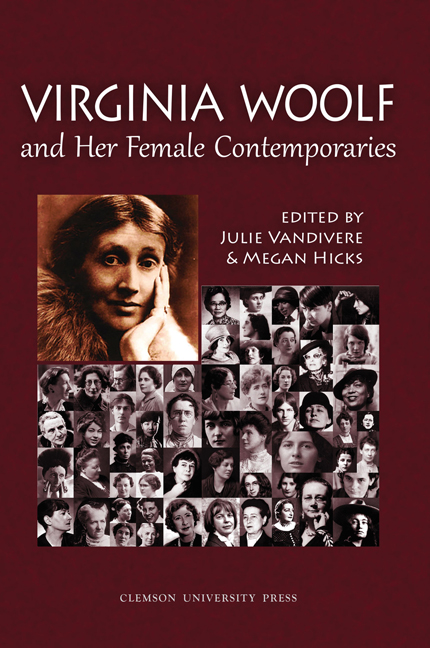Book contents
- Frontmatter
- Table of Contents
- Introduction
- Acknowledgments
- Abbreviations
- Who Are Virginia Woolf's Female Contemporaries?
- Virginia Woolf's Cultural Contexts
- Virginia Woolf and the Book Society Limited
- The Outsider as Editor: Three Guineas and the Feminist Periodical
- Woolf 's Imperialist Cousins: Missionary Vocations of Dorothea and Rosamond Stephen
- Mary Sheepshanks, Virginia Stephen, and Morley College: Learning to Teach, Learning to Write
- Moving Picture This: Virginia Woolf in the British Good Housekeeping!? or Moving Picture This: Woolf 's London Essays and the Cinema
- “Quota Quickies Threaten Audience Intelligence Levels!”: The Power of the Screen in Virginia Woolf 's “The Cinema” and “Middlebrow” and Betty Miller's Farewell Leicester Square
- Virginia Woolf's Contemporaries Abroad
- Virginia Woolf's Contemporaries at Home
- Tribute to Jane Marcus
- Notes on Contributors
- Conference Program 223
“Quota Quickies Threaten Audience Intelligence Levels!”: The Power of the Screen in Virginia Woolf 's “The Cinema” and “Middlebrow” and Betty Miller's Farewell Leicester Square
from Virginia Woolf's Cultural Contexts
- Frontmatter
- Table of Contents
- Introduction
- Acknowledgments
- Abbreviations
- Who Are Virginia Woolf's Female Contemporaries?
- Virginia Woolf's Cultural Contexts
- Virginia Woolf and the Book Society Limited
- The Outsider as Editor: Three Guineas and the Feminist Periodical
- Woolf 's Imperialist Cousins: Missionary Vocations of Dorothea and Rosamond Stephen
- Mary Sheepshanks, Virginia Stephen, and Morley College: Learning to Teach, Learning to Write
- Moving Picture This: Virginia Woolf in the British Good Housekeeping!? or Moving Picture This: Woolf 's London Essays and the Cinema
- “Quota Quickies Threaten Audience Intelligence Levels!”: The Power of the Screen in Virginia Woolf 's “The Cinema” and “Middlebrow” and Betty Miller's Farewell Leicester Square
- Virginia Woolf's Contemporaries Abroad
- Virginia Woolf's Contemporaries at Home
- Tribute to Jane Marcus
- Notes on Contributors
- Conference Program 223
Summary
In “Middlebrow” (a 1932 posthumously published letter to The New Statesman), Virginia Woolf satirically defends the delicately balanced relationship between the “lowbrow” and the “highbrow.” What better place to see this perfect balance of equal dependence, she suggests, but at the cinema, where class and taste distinctions are clearly exhibited. Woolf writes,
Lowbrows need highbrows and honour them just as much as highbrows need lowbrows and honour them. This too is not a matter that requires much demonstration. You have only to stroll along the Strand on a wet winter's night and watch the crowds lining up to get into the movies. These lowbrows are waiting, after the day's work, in the rain, sometimes for hours, to get into the cheap seats and sit in hot theatres in order to see what their lives look like. Since they are lowbrows, engaged magnificently and adventurously in riding full tilt from one end of life to the other in pursuit of a living, they cannot see themselves doing it. Yet nothing interests them more. Nothing matters to them more. It is one of the prime necessities of life to them—to be shown what life looks like. And the highbrows, of course, are the only people who can show them. Since they are the only people who do not do things, they are the only people who can see things being done. (179)
While on the surface, Woolf 's letter is in many ways a humorous example of her self-proclaimed snobbery, her assessment here of the codependent dynamic between the lowbrow cinema-goer and the highbrow cinema-maker cuts deeply to critique the British film industry of the late 1920s and early 1930s. This essay traces the history of the Cinematographic Film Act (hereafter, CFA) of 1927, a piece of legislation created for the British film industry that some film scholars view as an unfortunate blip on the national cinema's radar and others view with outright contempt. After establishing the historical impact of the CFA and contextualizing it with Woolf 's discussion of the brows in “Middlebrow” (written five years into the CFA's hold on the industry), the essay concludes with a reading of Betty Miller's 1941 novel, Farewell Leicester Square, as a “meta-filmic” critique of the deleterious effects of the CFA on British film culture of the 1930s.
- Type
- Chapter
- Information
- Virginia Woolf and Her Female Contemporaries , pp. 86 - 92Publisher: Liverpool University PressPrint publication year: 2016



